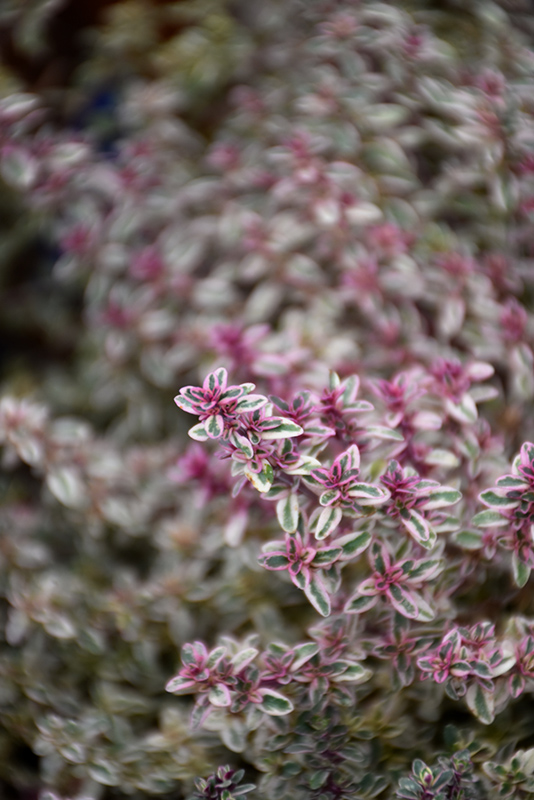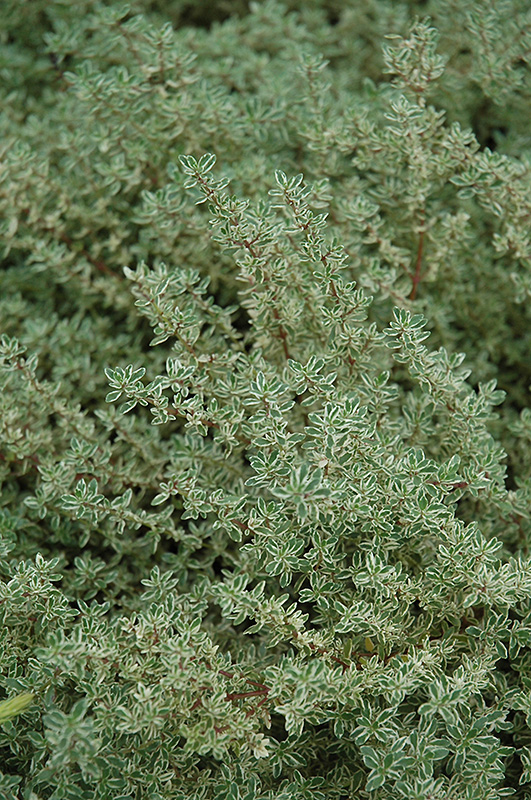Find Plants
Silver Posie Thyme
Thymus vulgaris 'Silver Posie'
Height: 10 inches
Spacing: 15 inches
Sunlight:
![]()
Hardiness Zone: 6
Edible Qualities
Silver Posie Thyme is a perennial herb that is commonly grown for its edible qualities, although it does have ornamental merits as well. The tiny fragrant round grayish green leaves with distinctive white edges can be harvested at any time in the season. The leaves have a savory taste and a pleasant fragrance.
The leaves are most often used in the following ways:
- Cooking
- Drying
- Seasoning
Features & Attributes
Silver Posie Thyme is smothered in stunning clusters of lavender flowers with pink overtones at the ends of the stems from early to mid summer, which emerge from distinctive purple flower buds. Its attractive tiny fragrant round leaves remain grayish green in color with distinctive white edges throughout the year.
This is a dense herbaceous evergreen perennial herb with a spreading, ground-hugging habit of growth. It brings an extremely fine and delicate texture to the garden composition and should be used to full effect. This plant will require occasional maintenance and upkeep, and is best cleaned up in early spring before it resumes active growth for the season. Deer don't particularly care for this plant and will usually leave it alone in favor of tastier treats. Gardeners should be aware of the following characteristic(s) that may warrant special consideration;
- Spreading
Aside from its primary use as an edible, Silver Posie Thyme is sutiable for the following landscape applications;
- Rock/Alpine Gardens
- Border Edging
- General Garden Use
- Groundcover
- Herb Gardens
Planting & Growing
Silver Posie Thyme will grow to be about 8 inches tall at maturity, with a spread of 18 inches. When grown in masses or used as a bedding plant, individual plants should be spaced approximately 15 inches apart. Its foliage tends to remain low and dense right to the ground. It grows at a medium rate, and under ideal conditions can be expected to live for approximately 10 years. As an evegreen perennial, this plant will typically keep its form and foliage year-round.
This plant is quite ornamental as well as edible, and is as much at home in a landscape or flower garden as it is in a designated herb garden. It should only be grown in full sunlight. It prefers dry to average moisture levels with very well-drained soil, and will often die in standing water. It is considered to be drought-tolerant, and thus makes an ideal choice for a low-water garden or xeriscape application. It is not particular as to soil type or pH. It is highly tolerant of urban pollution and will even thrive in inner city environments. Consider covering it with a thick layer of mulch in winter to protect it in exposed locations or colder microclimates. This is a selected variety of a species not originally from North America. It can be propagated by division; however, as a cultivated variety, be aware that it may be subject to certain restrictions or prohibitions on propagation.
Disclaimer - This Plant Finder tool is an online resource representing many of the varieties that we carry over the course of the season, and is intended for informational purposes only. Inventory varies seasonally, so we cannot guarantee that every plant will be in stock at all times - please contact the store directly for availability. It does not include our entire inventory of plants, so be sure to visit our store to see varieties that may not be represented on this list.


